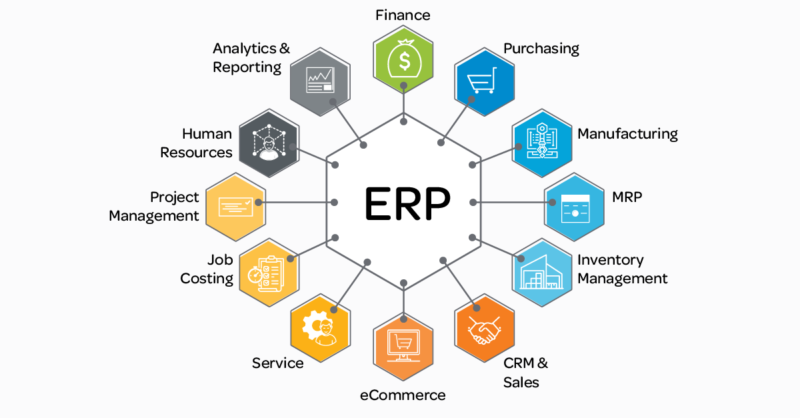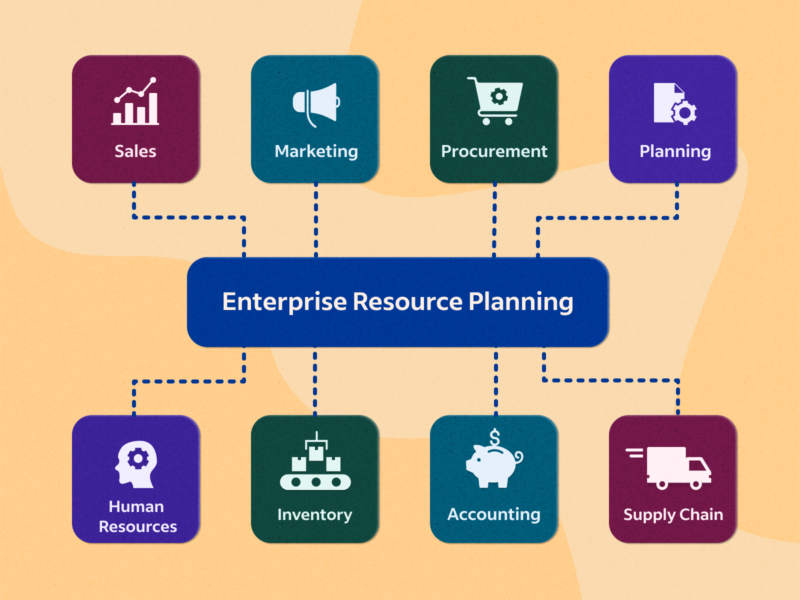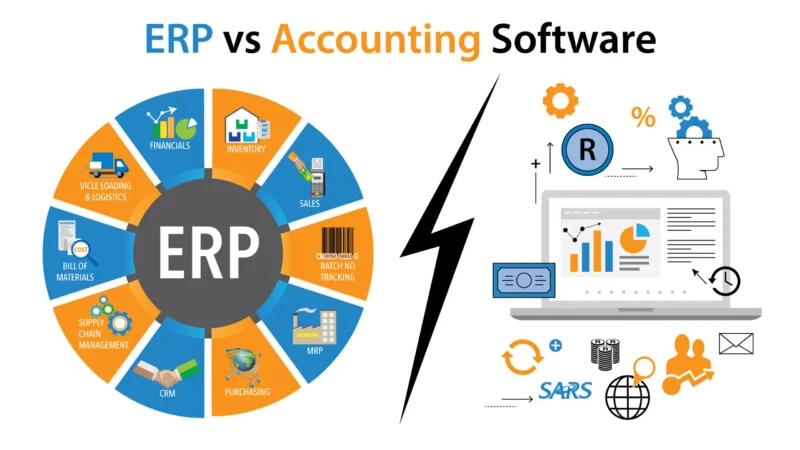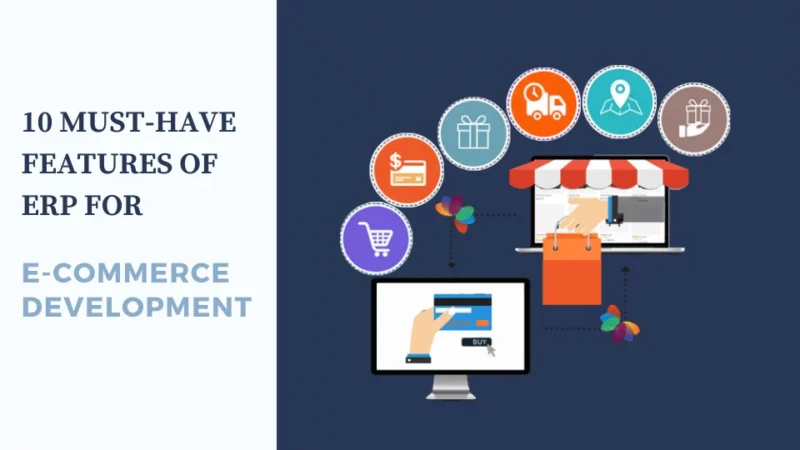In today’s fast-paced business environment, efficient management of operations is crucial for success. Discover the significance of commercial ERP software and why it’s a vital tool for businesses. Let’s explore the definition, importance, and benefits it offers.
TOC
- 1. What is Commercial ERP Software and Its Significance
- 2. Exploring Benefits and Features
- 3. Essential Features of Commercial ERP Software
- 4. Factors to Take Into Account When Selecting Commercial ERP Software
- 5. Top Commercial ERP Software Providers
- 6. Best Practices for Implementing Commercial ERP Software
- 7. Conclusion

What is Commercial ERP Software and Its Significance
Commercial ERP software, known as Enterprise Resource Planning software, integrates various business processes into a unified system. It enables organizations to oversee core functions like finance, HR, supply chain, manufacturing, and CRM on a centralized platform.
Imagine accessing real-time business data, from inventory to sales, to drive informed decisions effortlessly. This is the impact of commercial ERP software.
Exploring Benefits and Features

Commercial ERP software offers numerous advantages that can transform your business operations. By implementing a robust ERP system, you can:
- Optimize Operations: Automate tasks, streamline workflows, and enhance communication across departments for increased efficiency.
- Efficient Data Management: Centralized data storage ensures seamless information flow, reducing errors and enhancing accuracy.
- Enhanced Decision-Making: Real-time analytics empower quick and informed decision-making, aiding in identifying trends and forecasting demand accurately.
- Scalability and Customization: Scalable solutions adapt to your organization’s evolving needs, offering customization for specific industry requirements.
Explore the key features of commercial ERP software in the following section to enhance your business operations further. Join us on this journey!
Essential Features of Commercial ERP Software

Discover the array of essential features provided by commercial ERP software that can revolutionize how you oversee your business operations. Delve into these features to grasp their potential impact on your organization.
Comprehensive Data Management and Integration
An essential benefit of commercial ERP software lies in its capacity to deliver comprehensive data management and integration. By consolidating your business data within a unified platform, you can eradicate data silos and ensure seamless communication across various departments. This integration facilitates real-time data sharing, eliminating manual data entry and reducing error risks. By centralizing all your data, you can obtain a holistic business view and enable better-informed decision-making.
Streamlined Business Processes and Automation
Another pivotal feature of commercial ERP software is its capability to streamline business processes and automate repetitive tasks. Through the automation of routine activities like invoice generation or payroll processing, you can liberate valuable time and resources. This automation not only enhances efficiency but also minimizes the likelihood of errors inherent in manual processes. By optimizing workflows through streamlined business processes, you can boost productivity, focusing on strategic initiatives to foster growth.
Real-time Analytics and Reporting
Commercial ERP software offers robust analytics and reporting functionalities, granting access to real-time data insights. With customizable dashboards and reports, you can monitor key performance indicators (KPIs) and oversee your business’s health. These real-time analytics empower you to discern trends, identify potential issues, and make prompt data-driven decisions. Whether tracking sales figures, monitoring inventory levels, or analyzing customer behavior, commercial ERP software equips you with potent analytics tools.
Scalability and Customization Options
As your business progresses and grows, commercial ERP software provides scalability and customization avenues to evolve alongside you. With the flexibility to introduce new modules, users, and features, you can tailor the system to accommodate your organization’s evolving requirements. Furthermore, commercial ERP software supports customization, ensuring alignment with your industry-specific needs and unique business processes. This adaptability enables you to personalize the software to suit your organization’s demands, delivering a solution truly tailored to your objectives.
In the following section, we will discuss the factors to contemplate when selecting commercial ERP software, aiding you in making an informed decision aligned with your business goals. Let us continue this enriching journey together.
Factors to Take Into Account When Selecting Commercial ERP Software

When choosing the appropriate commercial ERP software for your business, it is essential to consider various key factors. Let’s delve into these aspects to guarantee that you reach a well-informed decision that is in line with your company’s objectives and needs.
Business Requirements and Objectives
Prior to delving into the extensive array of ERP software solutions available, it is imperative to conduct a thorough assessment of your business requirements and objectives. Dedicate the necessary time to pinpoint the specific functionalities and features that your organization necessitates. Are you primarily emphasizing finance and accounting management, or do you require robust inventory management capabilities? A comprehensive understanding of your distinct needs will facilitate the process of narrowing down the options and identifying a software solution that precisely aligns with your requirements.
Industry-Specific Requirements and Compliance
Various industries are governed by distinct regulations and compliance standards. When selecting commercial ERP software, it is vital to ascertain whether the software can meet these industry-specific demands. For instance, if your operations are within the healthcare sector, compliance with HIPAA regulations may be imperative. Ensure that the chosen ERP software adheres to the compliance standards and regulations pertinent to your industry.
Integration Capabilities with Existing Systems
The majority of businesses already have established systems and software in place. Therefore, it is critical to assess the integration capabilities of the ERP software under consideration. Can it seamlessly integrate with your current systems, such as CRM software, e-commerce platforms, or third-party applications? Effortless integration guarantees smooth data flow between systems, minimizing disruptions and enhancing operational efficiency.
Pricing and Implementation Expenses
Budgetary considerations play a significant role in the selection of commercial ERP software. Evaluate not only the initial procurement cost but also the expenses associated with implementation and ongoing maintenance. While certain software solutions necessitate substantial upfront investments, others offer flexible pricing structures, such as monthly subscriptions or pay-as-you-go models. Conduct a comprehensive budget analysis to ascertain the total cost of ownership in the long run, enabling an informed decision aligned with your financial capacity.
By taking into account these factors, you can navigate the extensive array of options and pinpoint the commercial ERP software that best addresses your business requirements. In the subsequent section, we will delve into the leading commercial ERP software providers, highlighting their features, strengths, and customer feedback. Let us proceed together on the quest to discover the ideal ERP software solution.
Top Commercial ERP Software Providers

Choosing the ideal commercial ERP software for your business requires a thorough examination of the top providers available. In this article, we will present three prominent companies in the field, emphasizing their unique features, strengths, and feedback from customers. Let’s delve into the details to determine the best fit for your business requirements.
SAP ERP
- SAP is a renowned German multinational software corporation that excels in providing an extensive array of enterprise software products and services. Among its offerings is the cutting-edge ERP system, SAP S/4HANA, which stands out for its advanced capabilities.
- The company is recognized for its robust functionality, impressive scalability, and widespread global presence, making it a top contender in the industry.
- With its focus on meeting the intricate requirements of large enterprises with global operations, SAP is a preferred choice for organizations seeking comprehensive solutions to drive their business success.
Oracle ERP
- An American multinational computer technology corporation, founded in 1977 by Larry Ellison, Bob Miner, and Ed Oates, that specializes in developing and marketing computer hardware, computer software, and cloud services worldwide.
- Offers two prominent ERP solutions – Oracle NetSuite, a cloud-based business management software suite, and Oracle ERP Cloud, a modern, integrated suite of applications.
- Renowned for its robust features, scalability, and strong database management capabilities, catering to the complex needs of mid-sized to large enterprises across various industries.
- With a history of innovation and a global presence, Oracle Corporation continues to be a top choice for businesses seeking advanced technological solutions.
Microsoft
- Microsoft Corporation, an American multinational technology giant, is renowned for its development, manufacturing, licensing, support, and sale of computer software, consumer electronics, personal computers, and associated services worldwide.
- Among its offerings is Microsoft Dynamics 365, a comprehensive suite of business applications encompassing an ERP system designed to streamline operations and enhance productivity.
- This software is celebrated for its intuitive user interface, seamless integration with various Microsoft products, and cost-effectiveness, making it an attractive option for businesses seeking efficiency and affordability.
- Particularly advantageous for small and medium-sized enterprises, especially those already utilizing Microsoft’s array of products and services.
Now that we have explored the top commercial ERP software providers, it’s time to move on to the next section, where we will discuss the best practices for implementing your chosen ERP software. So, let’s continue this journey to unlock the full potential of your business.
Best Practices for Implementing Commercial ERP Software

Implementing commercial ERP software can profoundly impact your organization. To ensure a successful implementation and optimize the advantages, it is imperative to adhere to best practices. Let us examine essential steps and strategies that can steer you through this endeavor.
Comprehensive Planning and Establishment of Clear Objectives
Prior to delving into the implementation phase, having a well-defined roadmap and objectives is critical. Begin by identifying the specific challenges and pain points your organization encounters. This will facilitate aligning the functionalities of the ERP software with your business requirements. Develop a project plan detailing the implementation schedule, resource distribution, and significant milestones. By setting precise objectives, you establish a robust foundation for a triumphant ERP implementation.
Ensuring Efficient Data Migration and Rigorous System Testing
Data migration is a pivotal aspect of commercial ERP software implementation, involving the transfer of data from existing systems to the new ERP platform. To ensure a seamless transition, conduct meticulous data cleansing to eliminate duplicates and inaccuracies. Formulate a data migration strategy encompassing data field mapping, defining data validation rules, and rigorous testing before the go-live phase. This approach will mitigate data integrity issues and facilitate a smooth transition to the new system.
System testing is equally crucial to identify and rectify potential glitches or compatibility challenges. Thoroughly test the ERP software in varied scenarios to ascertain its alignment with your business requirements. User acceptance testing (UAT) involving key stakeholders can validate the system’s usability and ensure it meets the desired objectives.
Training and Change Management Approaches
The implementation of commercial ERP software necessitates changes in processes and workflows, which may encounter employee resistance. To surmount this hurdle, invest in comprehensive training programs tailored to diverse user roles. This will empower employees to acclimate to the new system, embrace change, and harness the software’s full capabilities.
Effective change management strategies are pivotal in ensuring a seamless transition. Communicate the benefits of the ERP software to the workforce, involve key stakeholders in decision-making, and address concerns and inquiries proactively. By fostering a culture of acceptance and support, you can pave the way for a successful ERP implementation.
Ongoing Support and System Maintenance
ERP implementation is a continual process that requires establishing a support framework and allocating resources for system maintenance and upgrades. Regularly monitor the ERP software’s performance and promptly address any issues that arise. Maintain communication with the ERP vendor for updates, bug fixes, and new feature releases. Proactive system management ensures its longevity and sustained efficacy in supporting your business operations.
By adhering to these best practices, you can approach the implementation process with confidence and maximize the advantages of commercial ERP software. The subsequent section will conclude our exploration by summarizing the key points discussed and presenting final recommendations. Let us progress together on this stimulating journey.
Conclusion
Commercial ERP software revolutionizes businesses by streamlining operations, enhancing data management, and enabling informed decision-making. With scalability, real-time analytics, and customization options, it boosts efficiency and productivity. By saying goodbye to manual processes and data silos, businesses can enjoy seamless communication and automation. Choose a provider aligned with your needs to leverage these benefits effectively. Engage employees and stakeholders for a smooth transition, and establish an ongoing support system for the ERP software’s maintenance. By adhering to best practices and continuous improvement, your business can thrive in this dynamic landscape of digital transformation. Embrace ERP implementation with confidence, and unlock the full potential of your business today! By following these recommendations, businesses can successfully implement commercial ERP software and reap its numerous benefits. With proper planning, stakeholder engagement, and ongoing maintenance, ERP software can transform the way businesses operate and drive growth. It is a journey worth taking for any business looking to stay ahead in today’s fast-paced digital landscape. So let us embark on this journey together and harness the power of ERP software to drive our businesses towards success!
